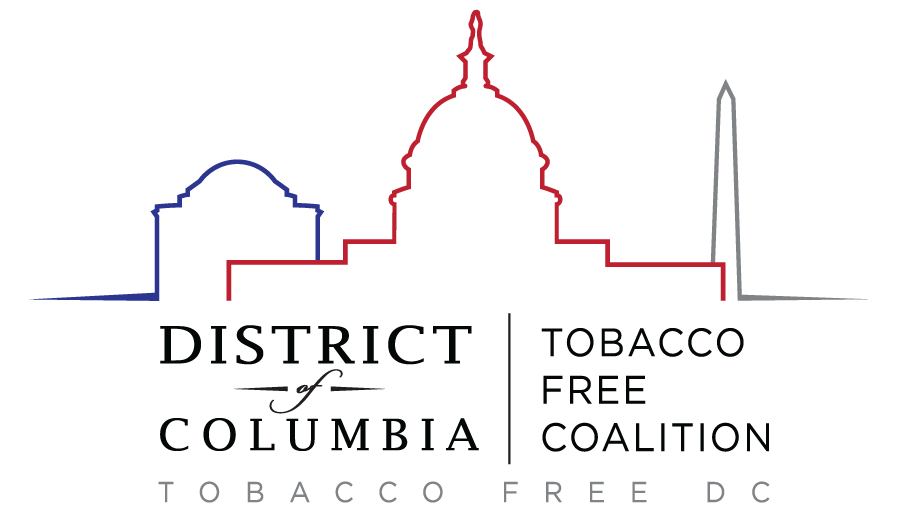The impact of tobacco use in Washington dc
A DC Tobacco Free Coalition Fact Sheet
Smoking is the leading cause of preventable death killing over 800 DC residents each year and can cause a significant decline in the quality of life the longer you smoke. Smoking also affects the entire family- when a family member smokes it can cause serious health consequences for nonsmoking family members, especially young children. The DC Tobacco Free Coalition (DCTFC) is committed to making sure all DC residents who smoke have access to smoking cessation treatments so they can stay quit for good.
• More than 16 percent of adults in Washington, DC are smokers. Tobacco-use rates are disproportionately high among certain populations in Washington, DC, including African Americans (26 percent) and lesbian, gay, bisexual and transgender adults (34 percent), according to the CDC. Source: Campaign For Tobacco Free Kids and the CDC
• Quitting smoking is associated with reduced risk for heart disease within one to two years, as well as reduced risk for lung cancer and many other types of cancer. Source: (US Surgeon General’s Report, 1990, p. vi)
• Smoking costs Washington, DC $391 million annually, with a total cost to DC Medicaid of $94.4 million. Smoking-related productivity losses in the District exceed $280 million per year. Nationwide, smoking costs $300 billion a year, including $170 billion spent on direct medical care. Source: Campaign For Tobacco Free Kids
• The state and federal tax burden for DC residents from smoking-caused government expenditures is equal to $860 per household. Source: Campaign For Tobacco Free Kids
• Smoking is the leading cause of preventable death and disease in the U.S. Smoking kills 800 District of Columbia residents each year and leads to a significant decline in quality of life for smokers. Source: Campaign For Tobacco Free Kids
• The U.S. Department of Health and Human Services recognizes tobacco dependence as a chronic disease that often requires repeated intervention and multiple attempts to quit. Source: Department of Health and Human Services
• Nearly seven in ten adult smokers would like to quit smoking, and over 61 percent of DC smokers have made an attempt to quit in the last year. Of the 40 million people in the United States who smoke cigarettes, many are unable to quit without assistance from healthcare providers. Source: The CDC and The Kaiser Family Foundation
• It is easier to inhale cigarette smoke with menthol, therefore menthol cigarettes are thought to make absorption of harmful chemicals in the body easier - 88.5% of African American smokers aged 12 years and older prefer menthol cigarettes. Source: The CDC
• Hookah smokers are under the false impression that it is less harmful than cigarette smoking. Despite the fact that hookah is water pipe smoking, it still delivers nicotine and hookah smokers may absorb more toxic substances because of the way it is smoked. Source: The CDC
• Smoking hookah for one-hour results in 200 puffs – the average smoke inhalation during a hookah session is 90,000 milliliters compared to that of 500-600 milliliters during a cigarette smoking session. Source: The CDC
• While use of cigarettes declined with middle school and high school students between 2011 and 2015, the use of electronic cigarettes among middle and high school students increased during this time. Source: The CDC
• Flavoring cigarettes and other tobacco and nicotine products makes them more appealing. A 2014 study shows that 1.5 million middle school and high school students used flavored e-cigarettes, 1.02 million used flavored hookah, and 910,000 used flavored cigars. Source: The CDC
• Every day in the United States 3,200 people below the age of 18 smoke their first cigarette - 9 out of 10 cigarette smokers first tried smoking by age 18. Source: The CDC
• Each year 1,100 children in DC try their first cigarette; there are 7,000 children alive in DC today who, based on current smoking levels, will die from smoking. Source: Campaign For Tobacco Free Kids
If you have questions about this content, the DC Tobacco Free Coalition, or other tobacco related issues please contact us at dctfc1@gmail.com or 202.574-6024



